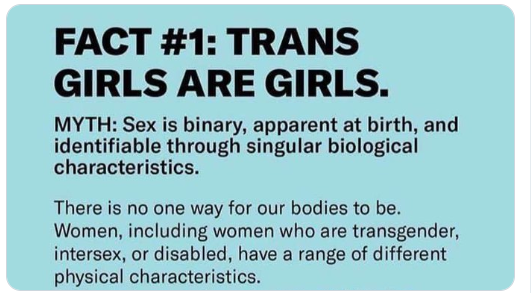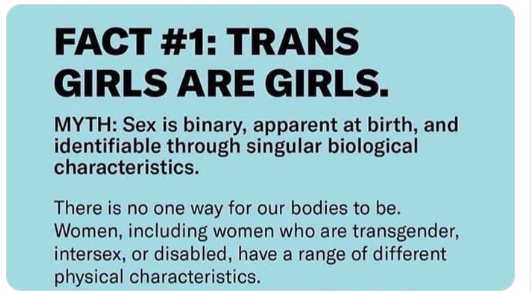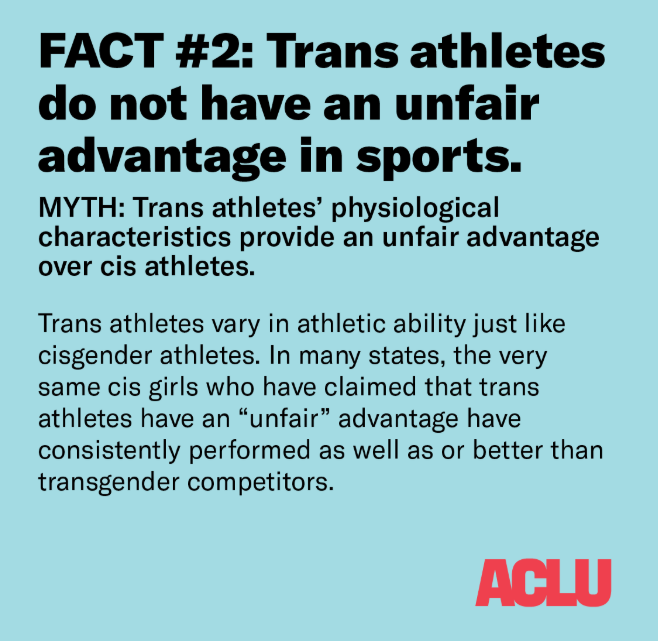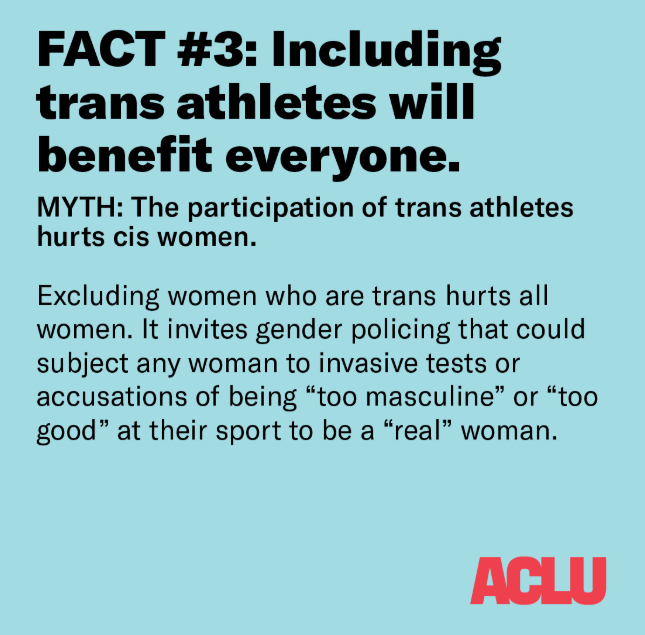For eons, "sex" has meant something simple and specific, as set out by Wikipedia:
Organisms of many species are specialized into male and female varieties, each known as a sex.[1][2] Sexual reproduction involves the combining and mixing of genetic traits: specialized cells known as gametes combine to form offspring that inherit traits from each parent. The gametes produced by an organism define its sex: males produce small gametes (e.g. spermatozoa, or sperm, in animals) while females produce large gametes (ova, or egg cells).
Breaking news by the ACLU!
Let's look more closely at the first of the four graphics:

This is part of a trendy effort to redefine the word "sex" and it is fundamentally and objectively incorrect. The ACLU is as wrong here as if it were proclaiming that "The Earth is flat" or that that oxygen and hydrogen combine to make water.
"Sex" is binary. This is uncontroversial when we are discussing the sex of any animals other than human animals. Every successful farmer knows firsthand about the fact that sex is binary, and it would be a tragedy to meet a farmer who follows the ACLU advice. Any advice that claims to be about scientific facts, where human animals are given special rules, should send up numerous red flags. The ACLU is now officially in the business of religion, apparently, at least in that part of fundamentalist religion that disparages core findings of science.
I will happily abide by any person's sincere request that I call them a "man" or a "woman." This is their choice as how they want to present themselves as to gender. On the other hand, the "Myth" in the ACLU announcement is a myth. Trans activists will never be satisfied that they have changed their gender. They want more. Their strategy is to bully the rest of us into saying that hundreds of years of biology is false. They are insisting that the rest of us chant with them that it inappropriate to call a baby boy (a baby with testicles and a penis) a "boy." It is apparently not enough to say that the baby's sex is male and that there is a 1% chance that this child might someday identify as a girl or a woman, that it's gender might someday be that of a girl or a woman.
We are in the midst of a language war and society will need to decide whether they are going to allow well-established word meanings crumble because a tiny minority of people claim that their are being "damaged" or "erased." I sometimes think of a friend of mine who has no hands. In a room filled people, he would never have claimed that he was being "erased" or "damaged" or "injured" or that his "civil rights" were being violated to the extent that people in the room might use the word "hand" when he did not have hands. If they said, "raise your hand," or even "I've got to hand it to you," my friend would never have assumed that they were disparaging him in any way. That's because 99% of the people in the room had hands (he once did too). The 99% should not be expected to change their ways with regard to common language for the benefit of tiny minorities that have worked very hard to make themselves hyper-sensitive to ordinary experiences.

I'm certain that the trans activists would refuse to substitute the word "sex" (above) for gender. The linguistics war will thus continue . . .
BTW, the ACLU is doubling down on the trans agenda, including the "right" of male athletes who switch to female at the age of 25, after having a lifetime benefit of testosterone including an extra 8 inches in height and 10% more muscle, complete with penis and testicles, to compete against women, meaning those born and raised female.

There is more from the ACLU. They make it look so simple, when it this is being hotly contested by women athletes.

These issues present a mismatch. One side is presenting facts, while the other side is presenting highly distorted facts, combined with accusations and bullying. In my previous article about 2 +2, I cited to James Lindsay, I will cite to him again, as follows:
[P]ostmodernism, particularly in the hands of the ideology of Critical Social Justice, is not at all interested in truth. It is only interested in power, which it will establish through its attempted revolution, which it in turn knows it can only achieve by turning otherwise intelligent, well-meaning people into “accomplices” by manipulating their good will, charity, fear of being disliked or ostracized, and, especially, unawareness of what is actually going on beneath the rhetorical tricks they’re being served up with intentionally limited context."
Time will tell where this will go.





